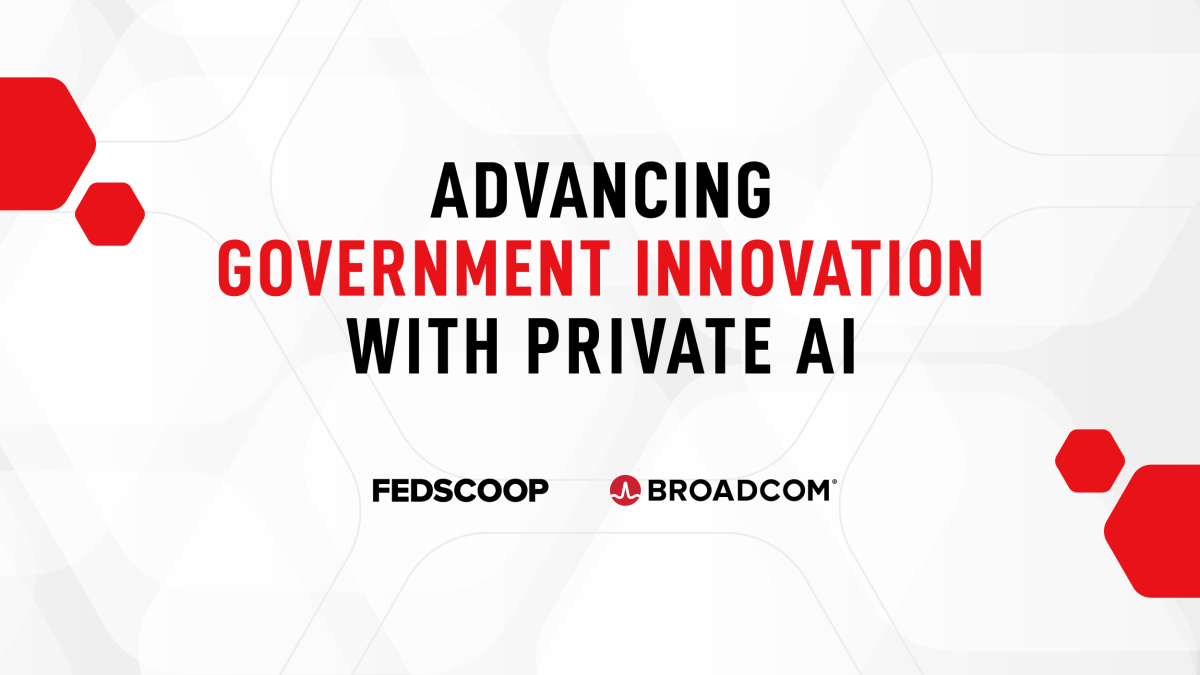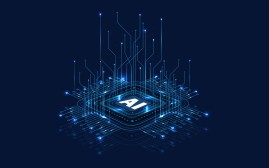- Sponsored
- Insights
Harnessing AI innovation across federal agencies

As artificial intelligence continues transforming the federal government, agencies are investing in innovative AI applications to enhance mission effectiveness, security and efficiency. In a recent video interview series, produced by Scoop News Group for FedScoop and underwritten by Broadcom, federal agency leaders and industry experts discuss their AI initiatives, the benefits they are experiencing and the infrastructure challenges they are working to overcome. The series also looks at the merits of “private AI.”
Advancing mission-critical work
Dr. Colin Crosby, U.S. Marine Corps service data officer and deputy Department of the Navy chief data officer, emphasizes the dual use of AI for decision support and battlefield applications. “We have to be ready to spin up GPUs when we need them and then scale back when the heavy workloads are done,” says Crosby, highlighting the need for flexible AI infrastructure to support diverse mission requirements.
Meanwhile, Garrett Berntsen, Deputy Chief Digital and AI Officer for Mission Analytics at the DOD, discusses the critical role of AI in battlefield awareness and command and control functions. “AI can be super powerful both for doing that fusing of the data across different types and locations and for all kinds of warfighting functions from analysis of the battlefield prediction,” he says. According to Berntsen, DOD is also investing heavily in computing power and upskilling personnel to meet AI’s growing demands.
In addition, NASA Digital Transformation Culture and Communication Lead Krista Kinnard talks about how AI helps astronauts evaluate their equipment in space and optimizes project management on the ground. “We are using AI not only to explore and discover but also to run NASA more efficiently,” says Kinnard, stressing the importance of thoughtful AI implementation to manage costs and energy usage.
Improving disaster management
Federal agencies are also using AI to improve disaster relief. U.S. Army Corps of Engineers CIO Dovarius Peoples pointed out that AI is revolutionizing disaster relief and infrastructure management. “We’re leveraging AI to better predict where flooding may occur and respond more effectively,” says Peoples.
Department of Homeland Security Deputy CIO for AI & Emerging Technology Chris Kraft also highlights AI’s transformative impact on agency operations, including border security and disaster management. “We are leveraging AI across our missions… improving the experiences of the people we serve and enhancing our national security,” says Kraft. DHS is also focused on using AI responsibly, ensuring it is rigorously tested for bias and privacy concerns.
Streamlining operations
IRS Chief of Artificial Intelligence Randy Soper discusses AI’s potential in enhancing taxpayer services and compliance. “We’re really excited about the potential that AI brings to the agency to deliver on the promises of the Inflation Reduction Act,” he says. In addition, Soper shares how the IRS is balancing between on-premises and cloud solutions to manage data security and costs effectively.
U.S. Senate Federal Credit Union CIO Mark Fournier details how AI is helping the organization manage complex data loads and streamline operations. “We’re doubling down on upskilling our internal talent to handle AI and integrate it into our mission,” says Fournier, while also emphasizing the need to balance immediate AI applications with long-term strategic planning.
Advancing cybersecurity efforts
In her interview, Melissa Vice, director of the Vulnerability Disclosure Program in the DOD’s Cyber Crime Center, explains how AI supports cybersecurity efforts within the DOD. “We are focusing on implementing AI to provide solutions at speed and scale, helping us protect sensitive data across the defense industrial base,” she says, noting the critical role of secure data management in law enforcement and intelligence activities.
In addition, Defense Information Systems Agency CTO Steve Wallace describes the growing role of generative AI in enhancing cybersecurity and operational efficiency. “We see AI sitting sidesaddle with analysts to help decompose attacks and respond quickly,” he says, underscoring the need for cautious adoption and measured investment in AI technologies.
Embracing private AI
While federal agencies are embracing AI to improve operations, the challenges of managing data security, upskilling personnel and investing wisely in AI infrastructure remain at the forefront.
Broadcom Global Head of AI Chris Wolf says private AI brings several benefits to federal space, including the ability to maintain privacy and control, lower costs and improve service delivery. “These are things that are really at the heart of the solution that we’ve been looking to drive,” says Wolf. “We want to make sure that an organization can just make one singular investment in AI infrastructure and future-proof it.”
Broadcom’s VMware Private AI solution provides governments an open architectural approach to leveraging AI while maintaining privacy, control and compliance. “This approach is not just about ensuring data privacy but about providing a scalable, efficient way for businesses to adopt generative AI technologies,” says Krish Prasad, senior vice president and general manager of Broadcom’s VMware Cloud Foundation Division.
This video series was produced by Scoop News Group, for FedScoop and sponsored by Broadcom.






